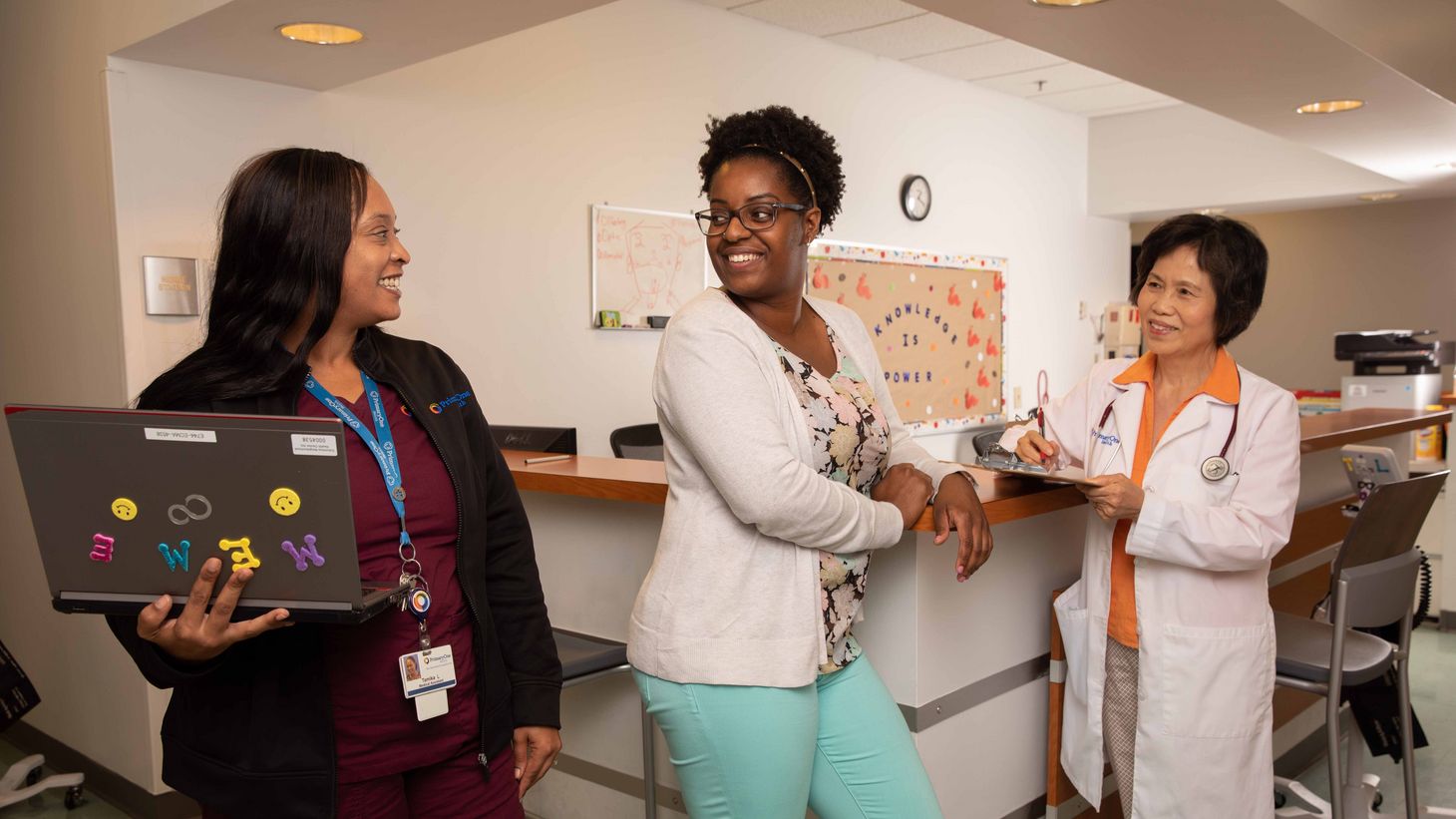by Wendy Bowles, Margaret Graham and Portia Zaire
The COVID-19 pandemic has exposed both the importance of and deficiencies in our healthcare system, including our primary care infrastructure. And beyond a shadow of a doubt, it has spotlighted the need for registered nurses to play a larger role in serving patients in primary care settings.
Primary care is defined by the Department of Health and Human Services (2019) as the provision of integrated, accessible health services by clinicians who are accountable for addressing a large majority of personal health care needs, developing a sustained partnership with patients and practicing in the context of family and community (HRSA, 2019). The primary care workforce is responsible for providing primary, secondary and tertiary prevention and the management of chronic disease. Approximately one-half of all Americans have at least one chronic disease and 25% of Americans have two or more chronic diseases. Ninety percent of healthcare dollars are spent on the management of chronic disease (APHA, 2020).
RNs now assume three emerging primary care functions: (1) managing the care of patients with chronic disease by facilitating behavior change and adjusting medications; (2) leading complex care management teams to help improve care and reduce cost for patients with multiple diagnoses; and (3) coordinating care between primary care homes and other providers (Bodenheimer and Bauer, 2017).
New data published by the Association of American Medical Colleges (AAMC) shows the U.S. could see an estimated shortage of between 21,400 and 55,200 primary care physicians by 2033. Nurse educators have recognized and met the need for more primary care professionals by expanding graduate nursing education, and the development of advanced nurse practice programs has proliferated. However, nursing education at the undergraduate level has not kept pace.
RNs comprise the largest healthcare profession in the United States. A redesign of nursing education and clinical experiences will propel how a transformed healthcare system meets the changing needs of our population. Undergraduate RN education should focus on the RN practicing at top of their scope. Indeed, all members of the healthcare team must practice at top of scope in order to satisfy healthcare needs and fill care gaps in our diverse communities. This includes RNs, who can help coordinate patient care that addresses complex care management and preventive measures for optimal levels of health. The new design will also enable RNs in primary care to help meet unmet demand in the management of chronic disease, behavioral health care and the overwhelming impact of the opioid epidemic.
Law and regulation for RN practice need to be evaluated in each state to ensure the RN is practicing at the top of their scope. Regulatory prohibitions of RNs using “patient diagnoses,” sometimes referred to as “medical diagnoses,” must be changed in Ohio and other states to maximize the RN’s participation on the healthcare team. In addition, the joint regulatory statement by the Ohio Boards of Pharmacy, Medicine and Nursing regarding the Use of Protocols to Initiate or Adjust Medications must be amended to allow RNs to work closely with the healthcare team in the management of patients with chronic disease. This will dramatically increase the number of educated professionals who can support patients with chronic disease and enhance access to care.
Well-prepared primary care RNs, working at the top of their scope, are able to:
- assume an enhanced role in the delivery of high quality care,
- use protocols to help manage chronic disease,
- use health coaching and other wellness strategies to assist in behavior change,
- expand community partnerships,
- provide evidenced based care across the life span to enhance patient safety,
- reduce adverse events,
- impact and improve patient satisfaction,
- support and promote optimal health status,
- track admissions and readmissions, and
- manage costs within and among continually expanding complex populations.
RNs are the best prepared to facilitate functioning of the interprofessional teams and coordinate care with patients (American Academy of Ambulatory Care Nursing, 2016). It is anticipated that the demand for primary care RNs in Ohio will grow due to changes in models of healthcare delivery, increased insurance coverage for care provided by RNs and the increased primary care needs of the aging population.
Faculty from The Ohio State University College of Nursing are helping meet the increasing need for primary care clinicians, with grant funding from the Health Resources and Services Administration (HRSA). Through this funding mechanism, the faculty designed three separate programs that equip the RN to practice as part of the interprofessional care team with shared responsibility and accountability for the health of populations: the RN in Primary Care Certificate, the Primary Care Academic Certificate for enrolled undergraduate students and the now-sunseted RN in Primary Care Residency.
The College of Nursing is the only academic institution in the region to offer this unique educational experience. The faculty have seen a great response and willingness of community RNs to strengthen their knowledge, skills and abilities. New and experienced RNs who have completed the certificate and residency programs have increased their confidence, expanded their capacity to be change facilitators in their organizations, acquired skills to use evidence-based practice and have validated and empowered the role of the RN in the primary care setting. This education, coupled with partnership from clinical agencies in the community, promises to accelerate what must be done to prepare RNs to transform health and improve lives for patients in primary care, now more than ever!
The three authors lead the RN in Primary Care program at The Ohio State University College of Nursing. Wendy Bowles, PhD, APRN-CNP, CNE, is assistant professor of clinical nursing and assistant dean for baccalaureate programs. Margaret Graham, PhD, APRN-CNP, FAANP, FNAP, FAAN, is associate professor and vice dean. Portia Zaire, MSNEd, BSN, RN-CCCTM, is nurse case manager.
This project is supported by the Health Resources and Services Administration (HRSA) of the U.S. Department of Health and Human Services (HHS) Nurse, Education, Practice, Quality and Retention Grant UK1HP31699 entitled Registered Nurses in Primary Care as part of an award totaling $2,763,494. The contents are those of the author(s) and do not necessarily represent the official views of, nor an endorsement, by HRSA, HHS, or the U.S. Government. For more information, please visit HRSA.gov.





